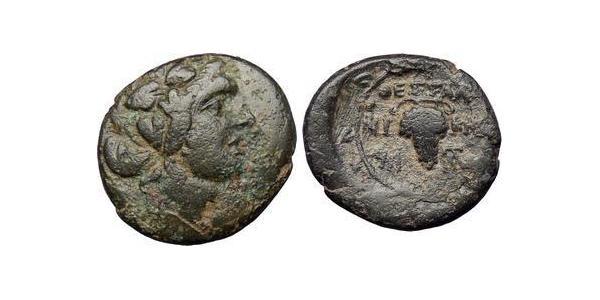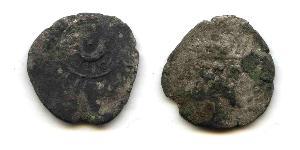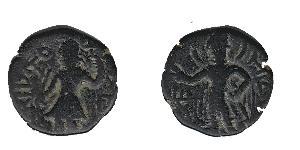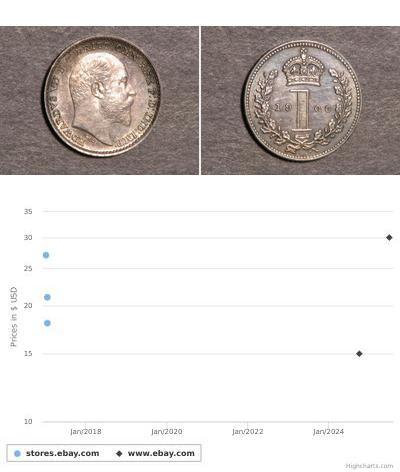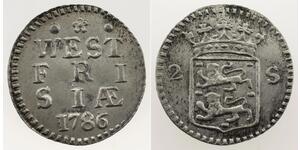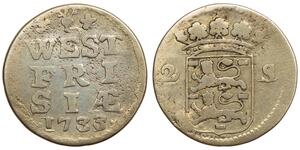[ 3507] MACEDON, THESSALONICA Bronze (25mm, 13.84 gr.), Macedon, Thessalonica - after 88 B.C. RARE. Reference: Moushmov 6609. Head of Dionysos right, wreathed with ivy. QESSALONIKHS, grapes, GA monogram, all in wreath. Provided with Certificate of Authenticity. CERTIFIED AUTHENTIC by Sergey Nechayev, PhD - Numismatic Expert Dionysus or Dionysos (Greek Διόνυσος) is the ancient Greek god of the grape harvest, winemaking and wine, of ritual madness and ecstasy, was also the driving force behind Greek theater. The god who inspires joyful worship and ecstasy, festivals and celebration is a major figure of Greek mythology and the religion of ancient Greece. He is included as one of the twelve Olympians in some lists. Dionysus is typical of the god of the epiphany, "the god that comes". He was also known as Bacchus, the name adopted by the Romans and the frenzy he induces, bakkheia. Hailed as an Asiatic foreigner, he was thought to have had strong ties to the East and to Ethiopia in the South. He was also known as the Liberator (Eleutherios), freeing one from one's normal self, by madness, ecstasy or wine. The divine mission of Dionysus was to mingle the music of the aulos and to bring an end to care and worry. Scholars have discussed Dionysus' relationship to the "cult of the souls" and his ability to preside over communication between the living and the dead. In Greek mythology, Dionysus is made out to be a son of Zeus and the mortal Semele. He is described as being womanly or "man-womanish". The retinue of Dionysus was called the thiasus and was composed chiefly of maenads and satyrs. Dionysus is a god of mystery religious rites. In the Thracian mysteries, he wears the bassaris or fox-skin, symbolizing new life. His own rites, the Dionysian Mysteries practiced by maenads and others, were the most secret of all. Many scholars believe that Dionysus is a syncretism of a local Greek nature deity and a more powerful god from Thrace or Phrygia such as Sabazios or Zalmoxis. Contradictions in Dionysus' origin suggest to some that we are dealing not with the historical memory of a cult that is foreign, but with a god in whom foreignness is inherent. Karl Kerenyi traces him to Minoan Crete, where his Minoan name is unknown but his characteristic presence is recognizable. Clearly, Dionysus had been with the Greeks and their predecessors a long time, and yet always retained the feel of something alien. Payment & Shipping: Will accept payments via PayPal. = MM_contentVersion;
}
else if (navigator.userAgent && navigator.userAgent.indexOf("MSIE")>=0 && (navigator.appVersion.indexOf("Win") != -1)) {
document.write('\n');
document.write('on error resume next\n');
document.write('MM_FlashCanPlay = ( IsObject(CreateObject("ShockwaveFlash.ShockwaveFlash." & MM_contentVersion)))\n\n');
}
if (MM_FlashCanPlay) {
document.write('');
document.write(' ');
document.write(' ');
document.write(' ');
document.write(' ');
document.write(' ');
document.write(' ');
document.write(' ');
document.write(' ');
document.write(' ');
document.write(' ');
}
else {
document.write(' ');
document.write(' ');
document.write(' This Vendio Gallery is best viewed with Macromedia Flash Player 6or higher. ');
document.write(' Click here to get the latestMacromedia Flash Player. ');
document.write(' ');
document.write(' ');
document.write(' ');
}
//--> Your browser does not support JavaScript. To view this page, enable JavaScript if it is disabled or upgrade your browser.
Mehr...

|
Beigetragen von:
anonymous 2015-08-19 |
Similar Coin Groups
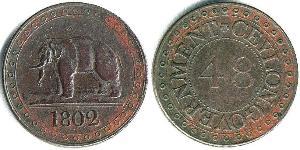
1 Stiver Königreich Großbritannien (1707 ...
Diese Gruppe hat 7 Münzen / 5 Preise
Add coin to this group

1 Altyn Zarentum Russland (1547-1721) / ...
Diese Gruppe hat 10 Münzen / 10 Preise
Add coin to this group
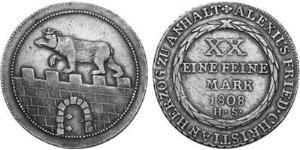
2/3 Thaler Anhalt-Bernburg (1603 - 1863) ...
Diese Gruppe hat 8 Münzen / 7 Preise
Add coin to this group

8 Maravedi Kingdom of Spain (1814 - 1873 ...
Diese Gruppe hat 5 Münzen / 3 Preise
Add coin to this group

200 Mark Weimarer Republik (1918-1933) A ...
Diese Gruppe hat 10 Münzen / 7 Preise
Add coin to this group
2025-06-14
- Historical Coin Prices
2025-05-24
- New coin is added to 2 Stuiver Niederlande Silber
2 Stuiver Niederlande Silber
Diese Gruppe hat 33 Münzen / 33 Preise
⇑
Netherlands / West-Friesland - 2 Stuivers 1733
Das könnte Sie auch interessieren:

